Theological virtues are virtues associated in Christian theology and philosophy with salvation resulting from the grace of God. Virtues are traits or qualities which dispose one to conduct oneself in a morally good manner. Traditionally the theological virtues have been named faith, hope, and charity (love). They are coupled with the four natural or cardinal virtues, and opposed to the seven deadly sins.
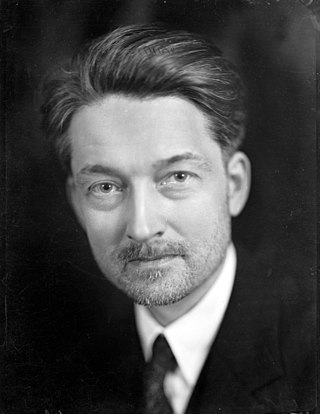
Jacques Maritain was a French Catholic philosopher. Raised as a Protestant, he was agnostic before converting to Catholicism in 1906. An author of more than 60 books, he helped to revive Thomas Aquinas for modern times, and was influential in the development and drafting of the Universal Declaration of Human Rights. Pope Paul VI presented his "Message to Men of Thought and of Science" at the close of Vatican II to Maritain, his long-time friend and mentor. The same pope had seriously considered making him a lay cardinal, but Maritain rejected it. Maritain's interest and works spanned many aspects of philosophy, including aesthetics, political theory, philosophy of science, metaphysics, the nature of education, liturgy and ecclesiology.

Thomism is the philosophical and theological school which arose as a legacy of the work and thought of Thomas Aquinas (1225–1274), the Dominican philosopher, theologian, and Doctor of the Church.

Bernard Joseph Francis Lonergan was a Canadian Jesuit priest, philosopher, and theologian, regarded by many as one of the most important thinkers of the 20th century.
The absence of good, also known as the privation theory of evil, is a theological and philosophical doctrine that evil, unlike good, is insubstantial, so that thinking of it as an entity is misleading. Instead, evil is rather the absence, or lack ("privation"), of good. This also means that everything that exists is good, insofar as it exists; and is also sometimes stated as that evil ought to be regarded as nothing, or as something non-existent.
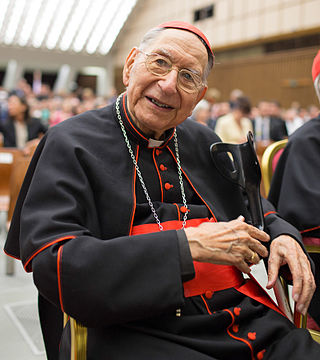
Georges Marie Martin Cottier was a Swiss Catholic prelate who served as Theologian of the Pontifical Household under Pope John Paul II from 1990 to 2005, after a career as a theologian and teacher. He was a member of the Dominicans and was made a cardinal in 2003.

How Should We Then Live: The Rise and Decline of Western Thought and Culture is a Christian cultural and historical documentary film series and book. The book was written by presuppositionalist theologian Francis A. Schaeffer and first published in 1976. The book served as the basis for a series of ten films. Schaeffer narrated and appeared throughout the film series, which was produced by his son Frank Schaeffer and directed by John Gonser. In the film series, Schaeffer attacked the influences of the Renaissance, the Enlightenment, and Charles Darwin. The films were credited with inspiring a number of leaders of the American conservative evangelical movement, including Jerry Falwell. The complete list of materials that the Schaeffers produced under the title "How Should We Then Live?" include the initial book, a study guide for the book, the ten-episode film series, and study aids for the films.
Theology of the Body is the topic of a series of 129 lectures given by Pope John Paul II during his Wednesday audiences in St. Peter's Square and the Paul VI Audience Hall between September 5, 1979, and November 28, 1984. It constitutes an analysis on human sexuality. The complete addresses were later compiled and expanded upon in many of John Paul's encyclicals, letters, and exhortations.
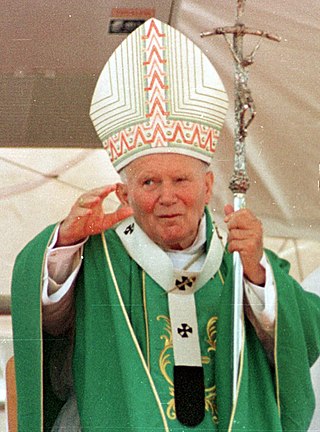
The teachings of Pope John Paul II are contained in a number of documents. It has been said that these teachings will have a long-lasting influence on the Church.
Aeterni Patris was an encyclical issued by Pope Leo XIII in August 1879. It was subtitled "On the Restoration of Christian Philosophy in Catholic Schools in the Spirit of the Angelic Doctor, St. Thomas Aquinas". The aim of the encyclical was to advance the revival of Scholastic philosophy.

Classical theism is a theological and philosophical form of theism that conceives of God as the ultimate, transcendent reality, characterized by attributes such as omnipotence, omniscience, and perfect goodness. Rooted in the ancient Greek philosophy of Plato and Aristotle, classical theism presents God as a being who is immutable, impassible, and entirely self-sufficient. This understanding of God emphasizes divine simplicity, where God's essence and existence are identical, making Him fundamentally distinct from all created beings.

Neo-scholasticism is a revival and development of medieval scholasticism in Catholic theology and philosophy which began in the second half of the 19th century.
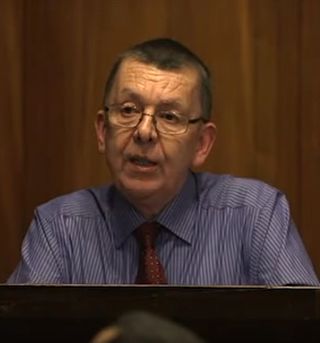
Brian Evan Anthony Davies is a British philosopher, Roman Catholic priest, and friar. He is Distinguished Professor of Philosophy, Fordham University, and author of An Introduction to the Philosophy of Religion, now in its fourth English edition, which has been translated into five languages.

Contra errores Graecorum, ad Urbanum IV Pontificem Maximum is a short treatise written in 1263 by Roman Catholic theologian Saint Thomas Aquinas as a contribution to Pope Urban's efforts at reunion with the Eastern Church. Aquinas wrote the treatise in 1263 while he was papal theologian and conventual lector in the Dominican studium at Orvieto after his first regency as professor of theology at the University of Paris which ended in 1259 and before he took up his duties in 1265 reforming the Dominican studium at Santa Sabina, the forerunner of the Pontifical University of Saint Thomas Aquinas, Angelicum, in Rome.
Catholic theology of sexuality, like Catholic theology in general, is drawn from "natural law", canonical scripture, divine revelation, and sacred tradition, as interpreted authoritatively by the magisterium of the Catholic Church. Sexual morality evaluates sexual behavior according to standards laid out by Catholic moral theology, and often provides general principles by which Catholics can evaluate whether specific actions meet these standards.

Thomas Aquinas was an Italian Dominican friar and priest, the foremost Scholastic thinker, as well one of the most influential philosophers and theologians in the Western tradition. He was from the county of Aquino in the Kingdom of Sicily.

The Augustinian theodicy, named for the 4th- and 5th-century theologian and philosopher Augustine of Hippo, is a type of Christian theodicy that developed in response to the evidential problem of evil. As such, it attempts to explain the probability of an omnipotent (all-powerful) and omnibenevolent (all-loving) God amid evidence of evil in the world. A number of variations of this kind of theodicy have been proposed throughout history; their similarities were first described by the 20th-century philosopher John Hick, who classified them as "Augustinian". They typically assert that God is perfectly (ideally) good, that he created the world out of nothing, and that evil is the result of humanity's original sin. The entry of evil into the world is generally explained as consequence of original sin and its continued presence due to humans' misuse of free will and concupiscence. God's goodness and benevolence, according to the Augustinian theodicy, remain perfect and without responsibility for evil or suffering.

Treatise on Law is Thomas Aquinas' major work of legal philosophy. It forms questions 90–108 of the Prima Secundæ of the Summa Theologiæ, Aquinas' masterwork of Scholastic philosophical theology. Along with Aristotelianism, it forms the basis not only for the legal theory of Catholic canon law, but provides a model for natural law theories generally.
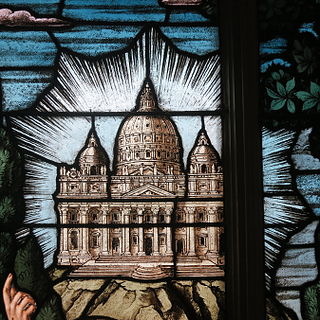
Catholic ecclesiology is the theological study of the Catholic Church, its nature, organization and its "distinctive place in the economy of salvation through Christ". Such study shows a progressive development over time being further described in revelation or in philosophy. Here the focus is on the time leading into and since the Second Vatican Council (1962–1965).
Sister Mary Prudence Allen is an American philosopher who converted to Catholicism and joined the Religious Sisters of Mercy. In 2014 she was appointed to the International Theological Commission for a five-year term by Pope Francis. Her areas of specialization include the history of philosophy, philosophical anthropology, philosophy of woman, existentialism, and personalism. Areas of competence include metaphysics, philosophy of God, epistemology and logic.











